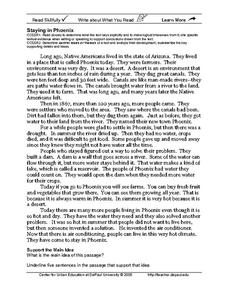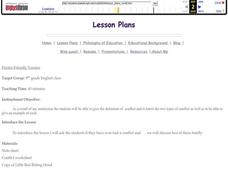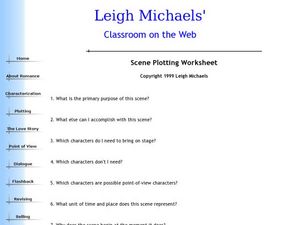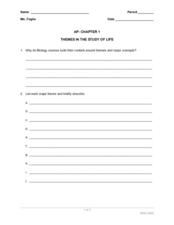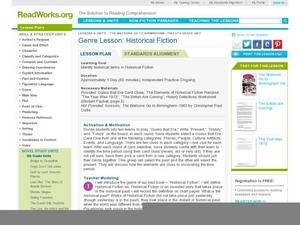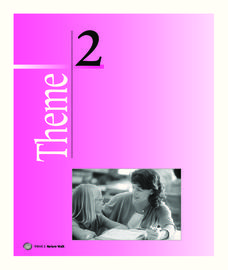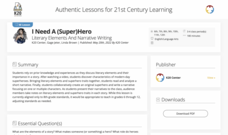Curated OER
Build Mastery: Main Idea
Use a graphic organizer to get readers thinking about main ideas as they record the who, what, where, when, and why of a story. Consider modeling this process completely before kids do this independently. They fill in five boxes charting...
Curated OER
Types of Irony: Examples & Definitions
Isn’t it ironic that many situations labeled ironic aren’t? Properly labeled examples of verbal, dramatic, and situation irony are defined and illustrated in a short, animated video that uses passages from literary works as models. The...
Curated OER
Synecdoche vs. Metonymy: Definitions
Ask your class to lend their ears, and eyes, to a short video that defines and offers examples of synecdoche and metonymy. Whether it be brand names like Kleenex® and Band-aids® that have come to stand for all the products in a category,...
Curated OER
Cliches, Paradoxes
Clichés, paradoxes, and equivocations are detailed in a short, animated video that defines and illustrates these writing traps. The resource also includes a quiz and the transcript for the video. Users can register to access free course...
Curated OER
Of Mice and Men: Chapter 2 Reading and Study Guide
Provide your class with this reading guide for chapter two of Steinbeck's Of Mice and Men. They grapple with new vocabulary words like swamper, cesspool, and mollified before checking out literary terms and answering a list of questions...
Curated OER
Staying in Phoenix
Read to learn! Here is a one-page informational passage about inhabitants of Phoenix, Arizona. Learners will read to make logical inferences and determine the central idea or theme. Prompts ask the class to identify the main idea and...
Curated OER
Conflict
Though the lesson plan format is simplistic, it's got some good ideas for addressing internal and external conflict in your literary analysis unit. Using "Little Red Riding Hood" and other fairy tales, young readers identify the...
Curated OER
Linguistic Humor and Language Play
By George, there are so many literary devices illustrated here! Help your pupils create interest in their writing by presenting one or two of these literary devices at a time. The slides contain examples and beg participation from the...
Curated OER
Flannery O'Connor's "A Good Man is Hard to Find": Who's the Real Misfit?
Learners discuss the characteristics of the literary genre known as "Southern Gothic". They write an analysis of the short story, "A Good Man is Hard to Find" by Flannery O'Connor.
Curated OER
Lord of the Flies--Chapter 2
In this literature analysis worksheet, pupils read Chapter two of Lord of the Flies and then answer reading comprehension questions.
Curated OER
Scene Plotting Worksheet
Think about literary elements, characters, and point-of-view. Then click on this link to have your class answer 14 questions intended to solidify, test, or review their understanding.
Curated OER
AP: Chapter 1: Themes in the Study of Life
Life science learners list and describe 10 major themes that biology courses are built around. They are introduced to the three domains and they consider the unity and diversity of living things. If your textbook does not have a chapter...
Curated OER
Hillbilly Feud:Language Arts Game
English language learners or native elementary schoolers will enjoy practicing their parts of speech with this interactive grammar game. Set deep in the backwoods of Tennessee, the class splits in two to join either the Hartfields...
Curated OER
Geography
You can use this geography PowerPoint as an aid for an introductory lesson to young geographers. The five themes of geography are presented: location, place, human-environment interaction, movement, and regions.
Curated OER
Figurative Language
Review and discuss literary devices using this resource, a PowerPoint about personification, simile, and metaphor. Learners can talk about metaphors, similes, and personification. This could a part of a more in-depth discussion of these...
Curated OER
Poetry: "The Poplar Field" by William Cowper
Explore poetry analysis. Learners read the poem "The Poplar Field" by William Cowper, answer a series of questions, and discuss literary devices. It is a terrific way to help your class understand how to read and understand poetry.
Curated OER
Genre Lesson: Historical Fiction
Take a trip through history with a lesson plan on historical fiction. With instructions for games, reading activities, and literary analysis assignments, this resource would be a great addition to any reading unit with a historical...
Curated OER
1984
In this novel analysis worksheet, students use the various sections with online links to complete activities about the novel 1984. Students explore domestic surveillance, the U.S. Patriot Act, online privacy, advertising, doublespeak,...
Benjamin Franklin Tercentenary
From Ben’s Pen to Our Lives
What would Ben do? Jumping off from the pseudonymous letters Ben Franklin fooled his older brother into publishing when he was still a teenager, young literary lovers dive into acting, writing, and addressing a local issue with wit and...
Houghton Mifflin Harcourt
Nature Walk: Extra Support Lessons (Theme 2)
Reinforce concepts such as long vowels, spelling patterns, sound clusters, double-final consonants, and syllables with a nature-themed unit. Through a series of extra support lessons, learners compare and contrast using a...
K20 LEARN
I Need A (Super)Hero: Literary Elements And Narrative Writing
Need a hero? Super! Groups create their modern-day marvel and craft a narrative with all the elements required in such a tale.
Houghton Mifflin Harcourt
That’s Amazing!: Extra Support Lessons (Theme 3)
Follow a teach, practice, and apply routine to provide extra support with a themed unit created by Houghton Mifflin. Topics include compound words, noting details, action verbs, suffixes, compare, and contrast, verbs, fantasy,...
New York State Education Department
Comprehensive English Examination: June 2015
Heroes rise from adversity. That theme forms the focus of the critical lens essay in a sample comprehensive English examination. The exam, which is part of a larger series of sample standardized tests, also includes two short response...
Houghton Mifflin Harcourt
Colors All Around: English Language Development Lessons (Theme 2)
A reading of the rhyme "Red Means Stop!" launches a three-week ELD/ESL study of color. The scripted daily lessons contained in the 32-page unit are packed with exercises, activities, and skill builders.
Other popular searches
- Literary Elements
- Five Themes of Geography
- Literary Analysis
- Literary Devices
- 5 Themes of Geography
- Literary Terms
- Art and Music Theme
- Literary Genres
- Five Themes
- Circus Theme Preschool
- Teaching Theme in Literature
- Comparing Literary Genres





